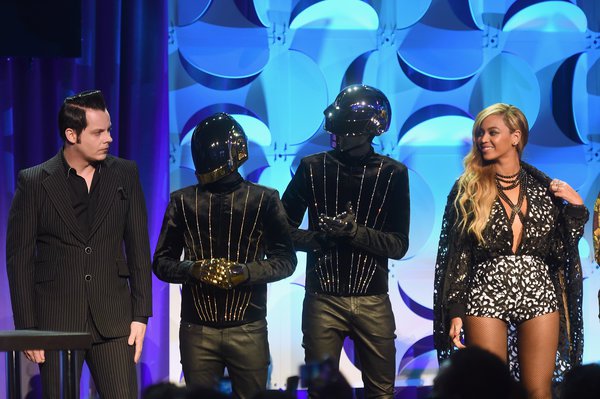Like every Grammy category, best rock performance has its own history, which also serves as a metaphor for the vagaries of the annual music awards. Since 1979, when the category was introduced, it has honored great songs (Bob Seger’s “Against the Wind”) and greatly popular ones (Survivor’s “Eye of the Tiger”); it’s had repeat winners (U2, seven times) and surprise winners (Bonnie Raitt and Delbert McClinton, for a 1991 duet). Three years ago, Imagine Dragons won, even though David Bowie and Led Zeppelin were also nominated, which may have puzzled even Imagine Dragons.
But this time, when the five nominated songs were announced by the Recording Academy, some Grammy voters raised an eyebrow: In addition to fairly straightforward nods for David Bowie (for “Blackstar”) and Twenty One Pilots (for “Heathens”), there was one for Beyoncé and two for live TV broadcasts of songs whose eligibility, in their original versions, had already expired.
Disturbed, the veteran hard-rock band, won a nomination for its dramatic performance of Paul Simon’s “The Sound of Silence” with a 15-piece orchestra on “Conan” in March 2016; the rock-soul foursome Alabama Shakes was nominated for “Joe,” which it recorded in October for the PBS series “Austin City Limits.”
“I was take back to the nominations,” said David Gorman, a Grammy voter who won a best boxed recording package award in 1997 as an art director of “Beg, Scream & Shout! The Big Ol’ Box of ’60s Soul.” “They seem like desperate attempts to get in on a technicality, which I guess is the new normal. But it’s not in the spirit of what the award was created for.” (Best rock performance is a prize that goes to the performing artist, not the songwriter.) Grammy nominations, Mr. Gorman added, are “a weird system that begs to be gamed, in an industry that lives to game systems.”
To be eligible for this year’s Grammy Awards, music must have been released after Oct. 1, 2015, but before Sept. 30, 2016. Disturbed recorded “The Sound of Silence” for its album “Immortalized,” which was released before the deadline. But because the band played on “Conan” during the eligibility period, its label, Warner Bros., could nominate it.
Alabama Shakes included “Joe” as a bonus track in Japan and other non-North American countries on its second album, “Sound & Color,” which was released in April 2015 and won a 2016 Grammy as best alternative music album. “Austin City Limits” didn’t include “Joe” in the January 2016 broadcast, but offered it as a web exclusive on its site.
“Are we deserving of a Grammy?” David Draiman, lead singer of Disturbed, asked. “That’s the question.” (He didn’t answer it.) “But are we eligible? Yeah, because we used that loophole.”
The video of “The Sound of Silence” went viral, logging more than 45.4 million views on YouTube. It is also the most-viewed song at the “Conan” website, teamcoco.com. When told, though, that some Grammy voters do not think a TV performance of an older song should qualify, Mr. Draiman said he didn’t disagree, but he was still happy to have a chance to win. “The song connected with people,” he said. “That’s not something you can create artificially.”
The Recording Academy defended the integrity of the nominating process. “I wouldn’t call it gaming the system. I wouldn’t even call it a loophole,” said Bill Freimuth, the senior vice president for awards at the Recording Academy. “Anything that’s eligible is eligible.”
The nominating process begins when record companies submit their artists for consideration in specific categories after strategizing to increase the odds of winning more trophies; then the academy scrutinizes the submissions for chicanery. Mr. Freimuth said that there were 24 committees that adjudicate genre, made up of experts in each specific style. When Beyoncé’s label, Columbia Records, submitted her for best rock performance, an academy staff person flagged it for discussion.
In September, about 70 members of the Rock Sorting Committee met to discuss, among other topics, whether “Don’t Hurt Yourself” is a rock song. Beyoncé wrote, produced and recorded the song with Jack White, and they used a Led Zeppelin sample. “We played it for the group,” Mr. Freimuth said. “There wasn’t all that much discussion. Everybody said, ‘That’s a rock song.’”
According to a senior music executive who attended the meeting, and spoke on the condition of anonymity because he was not authorized to discuss the internal deliberations, there was a “very spirited debate that took maybe five minutes” and included several voters’ suspicions that by recording a rock song and a country song (“Daddy Lessons”) on her album “Lemonade,” Beyoncé was trying to “run the table” on nominations in a diverse group of categories.
For Mr. Freimuth, these kinds of debates and disagreements about categorization are as fun as they are unanswerable. “One of the phrases that resonates in my head is, ‘embrace subjectivity,’” he said. “That’s been fairly recent for me. Because it’s an adjudication process, we tried to put as much objective criteria into the process as we can. The bottom line is, we’re accounting for taste, and everybody knows there’s none of that.”
Sizing up his own chances for winning, Mr. Draiman said, “If we were to lose to anybody, Bowie’s the one I’d be voting for.” Did he, as an academy member, vote for Mr. Bowie rather than for his band? “We’re gonna leave it a mystery,” he said with a laugh.
Mr. Gorman, one of the Grammy voters who was disappointed with the nominees, said casting his vote was “a no-brainer.” He explained: “I’m a huge Alabama Shakes fan. But I voted for their album last year. It’s time to move on. I voted for Bowie.”

No comments:
Post a Comment